REPUBLIKA.CO.ID, JAKARTA - The Indonesian Ministry of Environment hostS the 15th Meeting of the ASEAN Working Group on Coastal and Marine Environment in Jakarta on June 11-12, 2014, which focuses on issues of coastal sustainable development.
The Ministry of Environments spokesperson for Environment and Climate Change Control, Arief Yuwono, said on Wednesday that the ASEANs coastal and marine environment working group had been actively working on these issues for 15 years, so Indonesia was honored to be the host this year.
According to Arief, coastal and marine environment reservations play an important role for the ASEAN people, who will reach a population of 633.1 million by 2015, or almost 10 percent of the worlds population, especially since they earn their livelihood from the sea.
"Thus, a sustainable development in coastal and marine areas has become more and more important," he noted.
Moreover, Arief added that ASEAN member states faced the same challenges and problems on coastal and marine environment management, such as cross-border sea pollution and the threat of climate change. Cross-border sea pollution is mainly caused by high sea traffic in the ASEAN region, particularly in the Malacca Strait and Singapore Strait.
Some oil spill accidents, either on a small or large scale, in the area of the Malacca Strait and Singapore Strait had also impacted the seas of other ASEAN members.
"This is automatically a significant loss for the people of the ASEAN who earn their livelihood from the sea as the spilled oil damaged the coastal and marine ecosystem and caused its resources to decline. Meanwhile, the recovery of the area takes time and a huge amount of money," Arief explained.
Therefore, the working group meeting in Jakarta is expected to arrive at an action plan to increase the resistance of coastal and marine environments and to protect the people living in the area from the threats of pollution and climate change.


